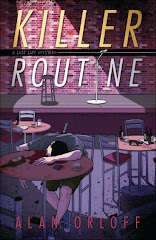I'm starting to realize I'm not very efficient at keeping track of my story's timeline as I write.
Here's what I do:
I start writing, using my outline as a guide. Eventually, I'll come to a scene where I have to "identify" what day of the week it is. After putting my "stake in the ground," I keep writing, only vaguely keeping track of when the action is taking place, mostly relying on my memory to keep things straight. Sometimes, to help me out, I'll type the day of the week in a different-colored font at the beginning of a scene. Unfortunately, most times I do not. As you might imagine, when I reach the end of the first draft, my story's timeline is a complete mess.
Invariably, I'll find out that I've crammed 45 hours worth of events into a single day. Or that I have characters going to church on a Tuesday or being in school on a Saturday or watching a pro football game on a Wednesday morning.
To fix things, I have to find a calendar and jot down the scenes, day by day. Then I have to rearrange scenes, change transitions, and fudge things to make them fit better.
Here's what I should do:
Find the calendar before I start writing, and KEEP TRACK OF MY TIMELINE AS I WRITE. Or better yet, INCORPORATE THE TIMELINE INTO MY OUTLINE.
Writers, how do you handle the timeline for your book during the writing process?

















10 comments:
Um. Well, that's not my strong suit. I get editorial help with that. It's always a big mess.
Elizabeth
Mystery Writing is Murder
Hi Alan, great topic! I've found that, for me, it's crucial that I firmly develop the timeline in the first draft (though I struggle with this). Writing in new scenes in your second or third draft requires that you place them correctly, because if you have a flawed timeline to begin with, you are in deep water. I like your calendaring idea -- that gives a structured approach. I wish I had a whiz-bang suggestion for crafting timeframe, but I don't. Looking forward to what others suggest...
This was something I had to learn quickly. Here's what works for me:
1) before writing, determine what year, month and day it is and set the starting date.
2) download a calendar of that month and the month following, if needed, with big enough blocks to write in. Write in any significant holidays first.
3) Immediately put on calendar the first scene and continue jotting on calendar as the days move by in your manuscript, noting holidays, weekends, etc.
4) I do the same for hours in the day if the day is jammed with action. I block the action off in hour by hour increments, and often use time setters like the protagonist listening to the 11 pm news, etc. Also remember to be realistic about how much time it takes characters to do something. If it takes 2 hours to get across town in traffic, then it must take your character that long, too.
I also keep notes on timelines for past books to track the time lapse between books. My books come out every year, but the timelines aren't always 12 months apart, sometimes more, sometimes less.
This works for me. Hope it gives you some ideas.
I like your question, Alan! I agree 100% that a timeline can be a big challenge. What I do is outline what I'm writing, and then break it down by month, then by week and set weekly goals. I find that setting daily goals is too stressful, since things crop up so often that can mess up a day. I know that's not a very detailed answer, but it helps me.
I get very logical. I'll make an outline saying Day 1 and put down in point form the main events. Then Day 2, etc. Yes, it's uncreative. But it has kept me sane more than once.
Elspeth
Elizabeth - You seem so organized; I find it hard to believe.
Lori - "Deep water" is a very kind term for where I find myself sometimes.
Sue Ann - I should have asked you this question years ago--this is going up on my wall! I tried something like this once, but I seemed to wander a bit...
Margot - When I write, I do set daily goals, and when I miss, I try to make sure I hit the weekly goals. Kind of like what you do, it sounds like.
Elspeth - Logic? Logic? What does logic have to do with writing?
I guess I’ve been lucky so far…or my plots (like me) pretty simple. I’ve not notice a timeline problem, nor had an editor or reader call me on a timeline violation. So, lucky pretty much describes me. However, now that I know it CAN be screwed up…you can bet I will screw it up. Sigh.
Best Regards, Galen
Imagineering Fiction Blog
In the rare case where a "mental timeline" is not going to do the job, I create one using a spreadsheet. Any decent program will let you autofill a column with dates, by year, month, day, hour, minute, whatever module you need. Adda another column for each character who needs to be tracked, or each object that might get passed around, or the state of the tides, the phase of the moon, age of the dog, whether the things in Bad Guy's refrigerator can still be eaten...
Galen - You can't fool me. I don't think "simple' describes any part of you.
Levi - Spreadsheets! Of course. Why didn't the engineer in me think of that? I'm slipping...
Seems like a good way to keep track of a whole host of characters and their events. Hmm, maybe I can even graph something.
The novel I'm working on is not so time dependent. It takes place over the course of a year, so I don't have a lot of time cues in it. I recently decided to put in some references to the weather (since it does drive one small plot point), and before I could do that I had to figure out in which months of the year each chapter transpired. I anchored myself with the last chapter (since it does end in a certain month) and then worked my way backward through each chapter. Now I'm going forward again, rewriting to put in whatever weather/seasonal references I think are helpful.
Nonfiction writer Sue Hubbell kept bees for many years in the Missouri Ozarks. She was especially busy when it was time to collect honey, and when she reviewed her notes after that season was over, she found that she had worked 34 days that month on her bees. That's devotion.
Post a Comment